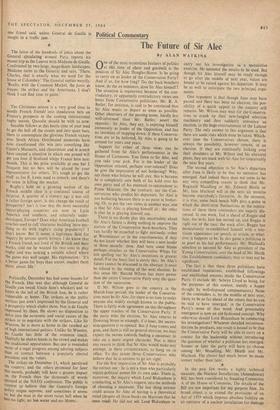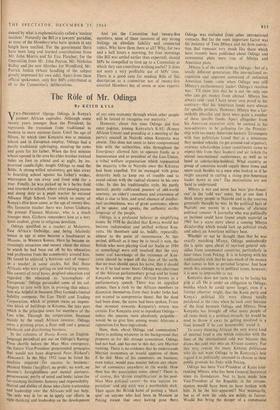Political Commentary
The Future of Sir Alec
By ALAN WATKINS
ONE of the most mysterious features of politics at this time of cheer and goodwill is the position of Sir Alec Douglas-Home. Is he going to carry on as leader of the Conservative Party? And if so, for how long? Do the back-benchers know, do the ex-ministers, does Sir Alec himself? The situation is mysterious because of the con- tradictory, or apparently contradictory views one hears from Conservative politicians. Mr. R. A. Butler, for instance, is said to be convinced that Sir Alec wants to depart as soon as possible. Other observers of the passing scene, hardly less well-informed than Mr. Butler, assert the opposite : Sir Alec, they say, is enjoying himself immensely as leader of the Opposition, and has no intention of stepping down. If these Conserva- tives are to be believed, Sir Alec is going to be around for years and years.
Support for either of these views can be gathered from Sir Alec's performances in the House of Commons. You listen to Sir Alec, and you take your pick. For is the leader of the Opposition relaxed, perhaps over-relaxed? Does he give the impression of not bothering? Why, say those who believe he will stay, this is because he is completely sure both of his hold over his own party and of his eventual re-instatement as Prime Minister. On the contrary, say the Con- servatives who predict his departure, Sir Alec is not bothering because there is no point in bother- ing. Or, to put the two views in another way, one is that Sir Alec is playing himself iti : the other is that he is playing himself out.
There is no doubt that this uncertainty about Sir Alec's future is doing nothing to improve the morale of the Conservative back-benchers. They can hardly be expected to fight zealously, either at Westminster or in the constituencies, if they do not know whether they will have a new leader in three months' time. And here some blame perhaps attaches to the Conservative Whips for not spelling out Sir Alec's intentions in greater detail. For the basic fact is surely this: Sir Alec's future cannot be discussed in the abstract. It must be related to the timing of the next election. In this sense Mr. Harold Wilson has more power than the entire Conservative Party over the ques- tion of the succession.
If Mr. Wilson goes to the country in the March-June period, the leader of the Conserva- tives must be Sir Alec, for there is no time to make anyone else widely enough known to the public. There is fairly wade agreement on this throughout the upper reaches of the Conservative Party. if the party wins the election, Sir Alec returns to Downing Street in triumph; if it loses, the succes- sion question is re-opened. But if June comes and goes, and there is still no general election, we may expect the moves towards finding a successor to take on a more urgent character. Nor is there any reason to think that Sir Alec would make any attempt, in these circumstances, to hang on to office. To this extent those Conservatives who believe that he is anxious to go are right.
For the first impression of Sir Alec is probably the correct one : he is not a man who particularly enjoys political power for its own sake. There is, moreover, the inquiry which Lord Blakenham is conducting, at Sir Alec's request, into the methods of choosing a successor. The last thing anyone could accuse Sir Alec of having is a theoretical mind• (despite all those books on Marxism that he once read). He did not ask Lord Blakenham to
carry out his investigation as a speculative exercise. He intended the results to be used. But though Sir Alec himself may be ready enough to go after the middle of next year, voices are bound to be raised against his departure. It may be as well to anticipate the two principal argu- ments.
One argument is that though June may have passed and there has been no election, the pos- sibility of a quick appeal to the country ,still remains. Mr. Wilson may wait for the Conserva- tives to crank up their new-fangled selection machinery and then suddenly announce an election, to the huge entertainment of the Labour Party. The only answer to this argument is that there are some risks which must be taken. Which- ever time the Conservatives choose, there is always the possibility, however remote, of an election. If they are continually looking over their shoulders at Mr. Wilson and his electoral plans, they are stuck with Sir Alec for conceivably the next five years.
The second objection to Sir Alec's departure after June is likely to be that no successor has emerged. And indeed there does not seem to be any very compelling reason to think that Mr. Reginald Maudling or Mr. Edward Heath or Mr. lain Macleod will in the next six months become everybody's favourite. At the moment, it is true, some back-bench MPs play a game in which the short-term fluctuations in the reputa- tions of these three contenders are eagerly dis- cussed. In one week, Ted is ahead of Reggie and lain; the next, lain has moved up, and Reggie is right out of the race; the week after, Reggie has miraculously re-established himself with a tele- vision appearance (or speech, or article, or what- ever it happens to be. In this game a politician is as good as his last performance). Mr. Macleod's selection to succeed Sir Alec as president of the Young Conservatives, over the head of Mr. Heath (the Establishment candidate), may or may not be significant.
The fact is that these three politicians have established reputations, established followings and established enemies inside the Conservative Party. (I exclude Mr. Selwyn Lloyd as being, for the purposes of this contest, merely a happy thought by well-disposed commentators.) None of the contenders is, by the middle of next year, likely to be so far ahead of the others that he can be said to have 'emerged,' in the Conservative Party's sense of that word. And presumably emergence is now an old-fashioned concept. Why otherwise should Lord Blakenham be conducting his investigations? Whatever detailed recommen- dations he produces, one result is bound to be that the Conservative Party will be able to carry on a contest for the leadership without introducing the question of whether a politician has emerged. Sooner or later the party will have to choose among Mr. Maudling, Mr. Heath and Mr. Macleod. The choice had much better be made sooner rather than later.
*
In the past few weeks a highly technical measure, the Nuclear Installations (Amendment) Bill, has been considered by Standing Committee A of the House of Commons. The details of the Bill are not important for my purpose here. Its broad object is to extend the provisions of an Act of 1959 which imposes absolute liability on an operator of a nuclear installation for damage
caused by what is euphemistically called a 'nuclear incident.' Naturally the Bill is a lawyers' paradise, as most of the Members who have spoken at any length have testified. For the government there have been long and learned contributions from Mr. John Morris and Sir Eric Fletcher; for the Opposition from Mr. John Peyton, Mr. Nicholas Ridley and the new Member for Woodford, Mr. Patrick Jenkin (whose handling of the subject greatly impressed his own side). Apart from these official spokesmen, only five MPs contributed at all to the Committee's deliberations.
And yet the Committee had twenty-five members, most of them innocent of any strong feelings on absolute liability and connected topics. Why have them there at all? Why, for two and a half hours a morning, for four mornings (the Bill was settled earlier than expected), should MPs be compelled to turn up to a Committee at which they can contribute nothing useful? It does not seem a very profitable use of MPs' time. There is a good case for sending Bills of this description to a committee not of twenty-five assorted Members but of seven or nine experts.





























 Previous page
Previous page